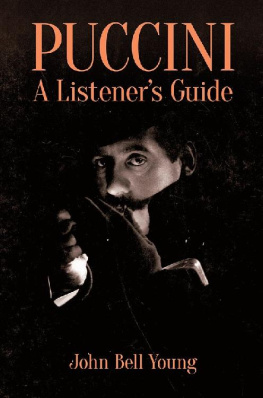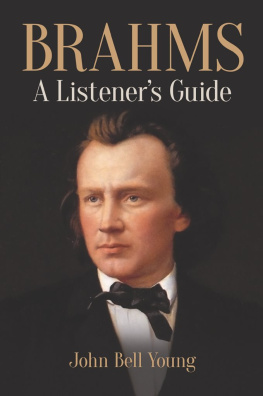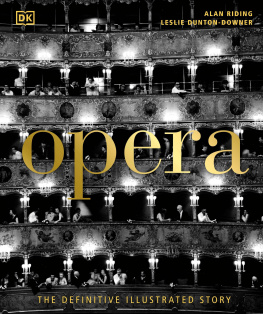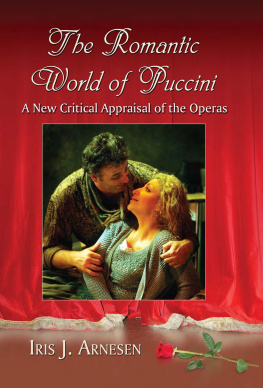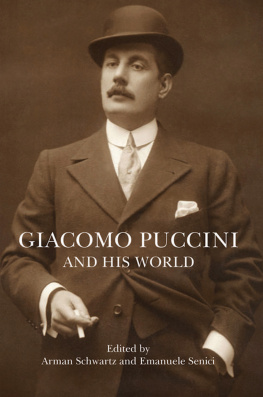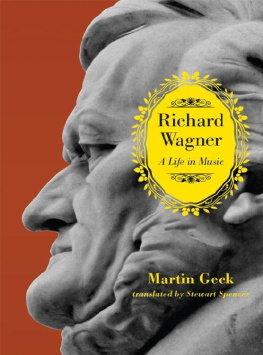PUCCINI
A Listeners Guide
John Bell Young
Dover Publications, Inc.
Mineola, New York
Dedication
To Marilyn George, for her unwavering support and
innumerable acts of kindness.
Copyright
Copyright 2008 by John Bell Young
All rights reserved.
Bibliographical Note
This Dover edition, first published in 2016, is a slightly altered republication of the work
originally published by Amadeus Press, New York, in 2008.
Library of Congress Cataloging-in-Publication Data
Young, John Bell.
Puccini : a listeners guide / John Bell Young.
pages cm
eISBN-13: 978-0-486-81055-3
1. Puccini, Giacomo, 18581924. Operas. 2. Opera19th century. 3. Opera20th century. I. Title.
ML410.P89Y68 2016
782.1092dc23 2015036360
Manufactured in the United States by RR Donnelley
79996401 2016
www.doverpublications.com
Contents
Acknowledgments
W riting about music, or any work of art governed by abstraction, is no easy task. One is easily persuaded by force of habit and by long-held beliefs in the veracity of a point of view, as if objectivity were the only thing that mattered.
But as any musicians worth their salt know only too well, there are no ivory towers: music is so complex and abundant as to invite any number of perspectives. And where those perspectives are informed and imaginative, they are worthy of contemplation.
Much the same can be said of any artistic endeavor, and writing is no exception. I am indebted for their assistance and advice to a number of friends and colleagues, several of whom did not live to see the completion of this project nor were even aware that what I learned from them would contribute to it so substantially.
Above all there is my late mother, Dorothy Burgess Young, without whose support and unflinching belief in my abilities I could never have written this volume or even so much as played a single note. Whether eerie coincidence or something born of a grander scheme, Amadeus Press offered me the formidable challenge of writing a dozen books for its distinguished roster only thirty minutes after my mothers passing in July 2007 at age eighty-eight. And so it is in honor of her that I commit to this enormous and challenging project.
There are in addition a number of individuals to whom I am indebted for their support and advice, literary and otherwise, while writing this book. First and foremost, I thank my best friend and partner, Michael Vincent Connelly, for his uncompromising friendship, patience, solidarity, tireless assistance, and unwavering faith in my abilities; Joseph Early and Sandra Rush, whose infinite patience, innumerable kindnesses, critical overview, and thoughtful consideration were not only proof of the deepest friendship, but equal to the best editorial advice; Reni Santoni and Tracy Newman, without whose assistance and counsel at a time when I most needed it I would surely never have been able to complete these works; Joseph and Veronique Fabio for their continued encouragement; Roberto Poli, a superb pianist whose encyclopedic knowledge of all things Italian and musical was an invaluable resource in this study of Puccini; Joanna Porackova, a phenomenal dramatic soprano and an extraordinary Puccini interpreter who taught me a great deal about opera; Alan Schneider, a splendid tenor; Michael York and Hugh Downs, both experienced authors, whose support has been unwavering and who have also shown tremendous patience in reading and critiquing my manuscripts; Mark and Camilla Tarmy, whose understanding and generosity of spirit know no bounds and who have patiently put up with my sometimes impossible demands for convenience and quietude; Tatyana Dudochkin and Mark Churchill of the New England Conservatory; Margarita Fyodorova, who taught me all about intonation and much more; Rick Bechard, whose eye and ear as a documentary filmmaker were invaluable, as he helped me to reconsider both style and narrative, which I can only hope find in these volumes a writer who does them justice; my friend of thirty years, Lord Montagu of Beaulieu, for his gracious assistance; Gordon and Emily Jones, Joseph Fichter, Julie Marden, and others in the extended Putney School family, for their encouragement, kindness, and help; and John Cerullo, the publisher of Amadeus Press. Thanks also to my editor at Amadeus Press, Jessica Burr; my meticulous copy editor, Angela Buckley; and to Michael Meltzer for suggesting Dover Publications to me in the first place. Thanks, too, to the Metropolitan Operas William Hicks, whose encyclopedic knowledge of opera has been invaluable to my research for this new edition.
Finally, to those who are no longer with us, I extend my gratitude in ways that I can only hope will be borne aloft on the wings of angels. From these individuals I learned much of what I know of music. Among them are Constance Keene, a great pianist who was also my teacher and mentor for nearly thirty years; Michel Block, likewise among the great pianists of the twentieth century, whose extraordinary musical savoir faire and personal gentility were a continual source of knowledge and enrichment; James Landrum Fessenden, a brilliant philosopher and musician whose premature death was a blow to all who knew him and whose willingness to share his phenomenally authoritative knowledge of any number of disciplines, from the aesthetics of opera to epistemology and psychoanalysis, has proven invaluable; and to both Claudio Arrau and Ernst Levy, the celebrated pianists who, in my few brief encounters with them, taught me more about music making than most could have done in a lifetime.
John Bell Young
Putney, Vermont
Introduction
I n this volume, it is my objective to survey great music from a personal perspective, just as anyone would. Whatever I can convey of my ideas about listening, though informed by analytical scrutiny and historical data, will not be enslaved by technical analysis. While academia continues to do its job in the classroom, pointing out idiosyncratic formalities as it teaches students to more effectively recognize compositional strategies, I prefer to do what I can to bring music to life in a kind of dialectical dance. This volume, then, is part musical analysis and part interpretation, but above all a personal appreciation. It is not intended to be nor should it be construed as a work of scholarship.
Nowhere will I presume that the reader will be following my musical observations with a score in hand. So often when we listen to music, things seem to fly off the page of the score or from the hands of the performer in ways that strike us as inexplicably new and exciting, as if we had just heard the piece for the first time. Perhaps thats simply how it should be. In any case, in attempting to put myself in the shoes of listeners, both those who are familiar with this music and those who may not be, I will do my best to bring them into the dynamic fold of the music as it reveals itself. And while there are certainly advantages to examining the score, there is also much to be said for letting your ears do what they do best when you trust your instincts: listening!
Though I presume that readers will have a minimal knowledge of the vocabulary of music, or access to information that would explain such things as meter, rhythm, note values, bar lines, and the array of Italian-language tempo and dynamic markings, I will nevertheless attempt, where appropriate, to demystify some of the larger issues pertaining to musical experience. To this end, I will evaluate and describe the more salient points of the compositional process, at least where such are relevant to opera. However, to move into strictly musical dimensions at the expense of drama, story, and stagecraft would defeat the purpose of evaluating opera in the first place, much less conveying its substance. Even so, as we begin this survey of Puccinis operas, it might benefit us all to look at a few basic technical concepts, albeit nothing too intimidating.
Next page
